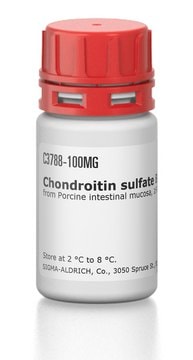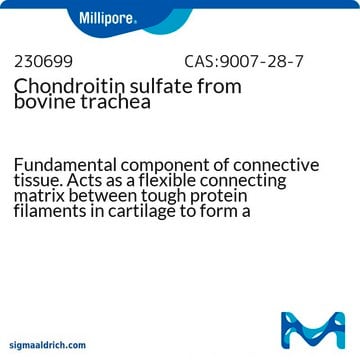C6737
Chondroitin sulfate sodium salt from bovine cartilage
98-102% (CPC, titration)
About This Item
Produits recommandés
Source biologique
bovine cartilage
Niveau de qualité
Qualité
standard (for CPC (cetylpyridinium chloride) titration)
Pureté
98-102% (CPC, titration)
Forme
powder
Activité optique
[α]20/D -30 to -20 °, c = 5% (w/v) in water
Impuretés
<10.0% water (Karl Fischer)
Couleur
white to off-white
Solubilité
H2O: soluble 50 mg/mL, clear to hazy, colorless to faintly yellow
Traces de cations
Na: 7.4-8.8% (anhydrous)
Température de stockage
2-8°C
Chaîne SMILES
[Na+].CC(=O)N[C@H]1[C@H](O)O[C@H](CO)[C@H](OS([O-])(=O)=O)[C@@H]1O[C@H]2O[C@@H]([C@H](O)[C@@H](O)[C@@H]2O)C(O)=O
Description générale
Application
Actions biochimiques/physiologiques
Composants
Attention
Notes préparatoires
Autres remarques
Code de la classe de stockage
13 - Non Combustible Solids
Classe de danger pour l'eau (WGK)
WGK 2
Point d'éclair (°F)
Not applicable
Point d'éclair (°C)
Not applicable
Équipement de protection individuelle
Eyeshields, Gloves, type N95 (US)
Certificats d'analyse (COA)
Recherchez un Certificats d'analyse (COA) en saisissant le numéro de lot du produit. Les numéros de lot figurent sur l'étiquette du produit après les mots "Lot" ou "Batch".
Déjà en possession de ce produit ?
Retrouvez la documentation relative aux produits que vous avez récemment achetés dans la Bibliothèque de documents.
Les clients ont également consulté
Notre équipe de scientifiques dispose d'une expérience dans tous les secteurs de la recherche, notamment en sciences de la vie, science des matériaux, synthèse chimique, chromatographie, analyse et dans de nombreux autres domaines..
Contacter notre Service technique







